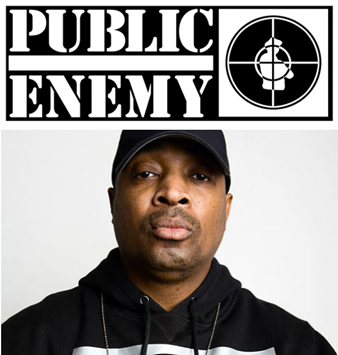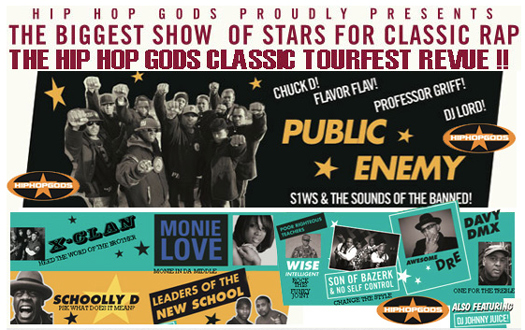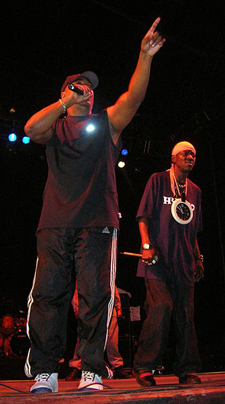Interview with a Hip Hop Legend, Chuck D
By Ashahed M. Muhammad -Asst. Editor- | Last updated: Dec 4, 2012 - 12:36:10 AMWhat's your opinion on this article?
Reflections and wise words of guidance from an industry pioneer: ‘My job is to provide service’

Chuck D
'Talk is not cheap because talk can start wars. Talk can bring world peace. So talk is always important. So if rappers are actually going to do things…if they can talk and say something, you’ll find out it will motivate and move people, but that power needs to be tested and that was what we were able to do—to test the power.' |
My fondest hip-hop memories are from 1986 and 1987. I remember attending a concert at the U.I.C. Pavilion in Chicago one summer. My best friend at the time named Hershal Walton went with me. Because we were too young to drive, and because there had been well publicized fights at some of the previous tour stops, my father took us, and stayed for the concert.
If my memory serves me correctly, the concert lineup featured all of the preeminent rappers of that time, P.E., RUN D.M.C., Whodini, L.L. Cool J, and if you can believe it, the opening act was Eric B. and Rakim. Rakim is now unquestionably one of the most respected and admired lyricists ever and considered one of the greats, but I remember at the concert, the crowd didn’t really know how to process it when they saw this young man (Rakim) with a blue and green sweat suit on—no dancers, no fireworks or props—just spittin’ lyrics. He was not yet known. Looking back, I now realize it was probably because of the scarcity of available hip-hop radio outlets here.
There were only two places on the radio where you could hear hip-hop, WHPK 88.5 FM which came through only on the South Side, (and even then with static) and WNUR 89.3 FM , which featured a hip-hop show, but could only be heard if you were on the North Side. There was one lone hip-hop club on the North Side called Steps near Loyola University that we used to go to, but at that time, House Music dominated the Chicago club and music scene. Steps was the only place we could go because it opened up in the mid-afternoon which made it so all of us underage “B-Boyz” could attend. Keep in mind, MTV (which was the only music video channel) had not yet begun to play hip-hop videos and there was no internet file sharing.
I recalled the energy in the crowd at the concert that night swaying and knowing the lyrics almost every song! I also remember my father with this kind of crazy look on his face as if he was saying ‘this **** is too loud!’ I remember thinking at the time that nothing could be better than that, and for the record, LL’s “I Can’t Live Without My Radio” was the first rap I learned every single word to.

|
“The Hip Hop Gods Tour”
December 6 - Minneapolis, MN, First Avenue
December 8 - Denver, CO, Ogden Theatre
December 9 - Park City, UT, TBA | December 10 - Aspen, CO, Belly Up
December 12 - San Diego, CA, 4th and B
December 13 - Los Angeles, CA, Club Nokia
(For more info visit http://hiphopgods.com)
To contextually grasp the concert’s magnitude, it would be like having Tupac, the Notorious B.I.G, Eminem, Jay-Z and NaS and Snoop Dogg (now Lion) all at one venue in the mid-90s. Still don’t get it? Then for those of you even younger in the hip-hop experience, that would be like having Drake, Nicki Minaj, Wiz Khalifa, Lil’ Wayne, Rick Ross, Kanye West and Kendrick Lamar all performing.
If you can relate to my experience, then you are probably already aware of the “Hip Hop Gods” tour hitting areas of the U.S. It is scheduled for the House of Blues in Chicago Dec. 5, and features Public Enemy, X-Clan, Monie Love, Schoolly D, Leaders Of The New School and Wise Intelligent of the Poor Righteous Teachers.
I was fortunate enough to ride with Chuck D as he drove up I-94 (yes, he drove himself) in the pouring rain, on his way to catch a flight at O’Hare Airport. His plane was delayed, so I had an extra-long chance to talk to him about any and everything after we arrived at the airport. At 52, he is still active and opinionated and we discussed several different projects he is involved in. The interview took place after his spirited appearance on a panel discussing hip-hop and politics at Columbia University with hip-hop activists Jasiri X, Rosa Clemente, Biko Baker and moderated by Bakari Kitwana.
He is aware of his honored role and stature as an elder and iconic hip-hop sage, and he appreciates the accolades, but first and foremost, he considers himself a servant of the people.
“I’m a hip-hop service man. My job is to provide service. This is my military. When people say thank you or stuff like that, these things have already been spoken by many, and maybe I process it a little different or whatever but it’s still in the direction of freedom,” said Chuck D.

|
He said Americans in general and Black people in particular should expand their horizons and begin looking beyond nationalism.
“We can’t name one-third of the countries on the planet and we can’t name one-third of the (United States). We can’t name things in our own locale or the History and the places we live,” he said. “We should understand that the whole planet is ours and we should understand that natural borders—we can pay attention to like oceans and mountains or whatever—but manmade borders we should kind of dissolve in our minds. Although we might not be able to move physically we should be able to move mentally. The web does that and makes somebody actually have something more in common with somebody they’re texting or typing to instead of actually being with them in their own physical space. Technology has kind of like connected the world beyond the borders and the orders.”
Fans of Public Enemy will recall the imagery used by the group and in the liner notes of “Fear of A Black Planet” members of Security of the First World (S1W) who were also members of the Fruit of Islam were pictured wearing their uniforms. Chuck D said everybody, including White fans were “clamoring over it” trying to get their hands on it because “human beings are attracted to the truth.” PE used their power to introduce certain important topics to the listeners, and just like they did it decades ago, it can be done again, he said.
Similar to how Minister Farrakhan describes how many Whites have grown up with Black sports and entertainment heroes, Chuck said all of that contributed to a time when a Black man could be elected president with many White votes. He believes the historical narratives and deliberate injection of consciousness into his lyrics also influenced that, even though some of the same social problems discussed in PE’s songs exists today.
He challenged todays artists to use their power and influence for good.
“I think we lent to that cultural contribution and culture is still—especially when you talk about music—is very powerful with Black people. So yes, there was a cultural contribution. We can’t brush it aside. It follows what the Minister has said for years ain’t nothing changed. As a matter of fact there’s really no big difference in time between 1988 and the year 2012, we’re suffering from the same or similar conditions …and here’s another thing for people who feel that talk is just cheap. Talk is not cheap because talk can start wars. Talk can bring world peace. So talk is always important. So if rappers are actually going to do things…if they can talk and say something, you’ll find out it will motivate and move people, but that power needs to be tested and that was what we were able to do—to test the power,” he added.
Citing Curtis Mayfield and James Brown and their culturally relevant lyrics he said, “They didn’t have to preach love, but they had to say—you know what? ‘I got your back.’ And most Black music was not derogatory. To us Black people, it was always ‘look out I got your back love music,’” he said.
Because the members of Public Enemy were raised during the 60s, the struggle was ingrained in their minds. He said he never considered making any songs that were not aimed at raising the awareness of the people and did not fear retaliation from record executives.
“We saw the assassination of Dr. King, Malcolm X, the Kennedys, the Vietnam War, the drug age and the infiltration and everything. So we were able to get a different over standing of what it was all about and me as a writer, I think I was … I never called myself skilled but I always said that some songs seemed to write themselves,” said Chuck D. “It was already in me from what I witnessed, so when I finally figured out the technique of writing songs…I was very blessed and honored to be chosen as a vehicle and I didn’t have nothing to lose either. I didn’t beg for a record contract I was begged to do records, so that kind of puts you in a different stance as well.”
Chuck is an advocate of independent delivery of music to the public and was a leader in the digital download revolution. In our conversation, he downplayed the importance of record executives and their companies in the current musical landscape calling their influence a “lingering perception.”
“The record companies have very little power to try to make people into stars,” said Chuck D. “It’s a lingering perception and perception lingers without education. People are not educated on what it is and what isn’t so they’ll continue to praise a ghost. It’s a ghost … record companies really right now are ghosts but then again you got people praising ghosts in all kinds of ways,” he said.
Chuck is circumspect regarding his life experience and says there are many moments that standout, but one of the most memorable and transformative moment in his 25-year career was when he traveled to Ghana for the Nation of Islam’s Saviours’ Day convention held there in October 1994.
“To perform at Independence Square in front of fifty thousand people, the Minister was there, Brother Akbar, that was very powerful and very memorable,” he said. “My first travel to Africa with the Nation— in Africa changed my life and my perception even further. I came back to America and I didn’t really care about …well, I didn’t care in the first place but it really made me not care about trying to be popular in America. I really didn’t give a damn at that point. And I had a conversation with the Minister before we played the Astrodome in 1996 The Family Day in Houston and what he told me that day—he probably forgot that he told me—but what he told me that day will stick with me a lifetime. He said ‘What seems like fire will be ice and then will turn back to fire again. Don’t be dismayed about how people will receive you or whatever, just stay your course. We’re coming into a time where people will look at fire and think it’s ice. People will look at ice and think it’s fire. Maintain your course. There’ll be some icy years, there’ll be some fiery years but you maintain what you are,’ and that helped,” he added.
(Follow Chuck D on Twitter @MrChuckD and visit him on the web at http://www.publicenemy.com.)
INSIDE STORIES AND REVIEWS
-
-
About Harriett ... and the Negro Hollywood Road Show
By Rabiah Muhammad, Guest Columnist » Full Story -
Skepticism greets Jay-Z, NFL talk of inspiring change
By Bryan 18X Crawford and Richard B. Muhammad The Final Call Newspaper @TheFinalCall » Full Story -
The painful problem of Black girls and suicide
By Charlene Muhammad -National Correspondent- » Full Story -
Exploitation of Innocence - Report: Perceptions, policies hurting Black girls
By Charlene Muhammad -National Correspondent- » Full Story -
Big Ballin: Big ideas fuel a father’s Big Baller Brand and brash business sense
By Bryan Crawford -Contributing Writer- » Full Story






 Click Here Stay Connected!
Click Here Stay Connected!








